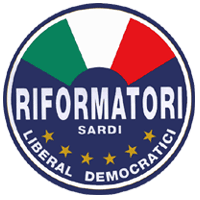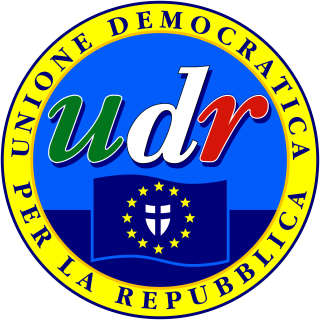Related Research Articles

Christian Democracy was a Christian democratic political party in Italy. The DC was founded on 15 December 1943 in the Italian Social Republic as the nominal successor of the Italian People's Party, which had the same symbol, a crusader shield. As a Catholic-inspired, centrist, catch-all party comprising both centre-right and centre-left political factions, the DC played a dominant role in the politics of Italy for fifty years, and had been part of the government from soon after its inception until its final demise on 16 January 1994 amid the Tangentopoli scandals. Christian Democrats led the Italian government continuously from 1946 until 1981. The party was nicknamed the "White Whale" due to its huge organisation and official colour. During its time in government, the Italian Communist Party was the largest opposition party.

Democracy is Freedom – The Daisy, commonly known simply as The Daisy, was a centrist political party in Italy. The party was formed from the merger of three parties within the centre-left coalition: the Italian People's Party, The Democrats and Italian Renewal. The party president and leader was Francesco Rutelli, former mayor of Rome and prime ministerial candidate during the 2001 general election for The Olive Tree coalition, within which The Daisy electoral list won 14.5% of the national vote.

The Italian Republican Party is a political party in Italy established in 1895, which makes it the oldest political party still active in the country. The PRI identifies with 19th-century classical radicalism, as well as Mazzinianism, and its modern incarnation is associated with liberalism, social liberalism, and centrism. The PRI has old roots and a long history that began with a left-wing position, being the heir of the Historical Far Left and claiming descent from the political thought of Giuseppe Mazzini and Giuseppe Garibaldi. With the rise of the Italian Communist Party and the Italian Socialist Party (PSI) to its left, it was associated with centre-left politics. The early PRI was also known for its anti-clerical, anti-monarchist, republican, and later anti-fascist stances. While maintaining those traits, during the second half of the 20th century the party moved towards the centre on the left–right political spectrum, becoming increasingly economically liberal.
Liberalism and radicalism have played a role in the political history of Italy since the country's unification, started in 1861 and largely completed in 1871, and currently influence several leading political parties.

The Christian Democratic Centre was a Christian-democratic political party in Italy from 1994 to 2002. Formed from a right-wing split from Christian Democracy, the party joined the centre-right coalition, and was a member of the European People's Party (EPP).

The Democratic Alliance was a social-liberal political party in Italy.

Italian Renewal was a centrist and liberal political party in Italy.

The Italian Socialists were a minor social-democratic political party in Italy active from 1994 to 1998. The party was the legal successor of the Italian Socialist Party (PSI), following its dissolution by the 47th Party Congress due to the severe financial crisis following the Tangentopoli scandal. A minoritarian group of the congress, who proposed an autonomist and centrist solution against the PSI dissolution, instead founded the Reformist Socialist Party.

The Sardinian Reformers is a regionalist and liberal-conservative political party in Sardinia, led by Michele Cossa. The party, which has always been part of the centre-right at the Sardinian regional level, is a keen supporter of the free market, competition, globalization and a two-party system.

The Democratic Union for the Republic was a short-lived Christian-democratic and centrist political party in Italy.

The first Prodi government was the 53rd government of Italy. It held office from 18 May 1996 until 21 October 1998.

The Segni Pact, officially called Pact of National Rebirth, was a Christian-democratic, centrist and liberal political party in Italy. The party was founded and named after Mario Segni, a former member of the Christian Democrats who was a prominent promoter of referendums.

Mariotto Segni is a retired Italian politician and professor of civil law. He founded several parties, which focused on fighting for electoral reform through referendums. He is the son of the politician Antonio Segni, one-time president of Italy.

The Pact for Italy was a centrist political and electoral alliance in Italy launched by Mario Segni and Mino Martinazzoli in 1994.

The Alliance of Progressives was a left-wing political alliance of parties in Italy formed in 1994, with relevant predecessors at local level in 1993. The leader of the alliance was Achille Occhetto. The alliance was a predecessor of the modern-day centre-left coalition.
The Liberal Democratic Foundation was a Christian-democratic and liberal Italian political party.

The Dini government was the 52nd government of the Italian Republic. It was the second and last cabinet of the XII Legislature. It held office from 17 January 1995 to 17 May 1996, a total of 486 days, or 1 year and 4 months. It was the Italian Republic's first Government of Experts, entirely composed of experts and officials from outside Parliament.
The Pentapartito, commonly shortened to CAF, refers to the coalition government of five Italian political parties that formed between June 1981 and April 1991. The pro-European and Atlanticist coalition comprised the Christian Democracy (DC), the Italian Socialist Party (PSI), Italian Democratic Socialist Party (PSDI), Italian Liberal Party (PLI), and Italian Republican Party (PRI).
The centre-left coalition is a political alliance of political parties in Italy active under several forms and names since 1995, when The Olive Tree was formed under the leadership of Romano Prodi. The centre-left coalition has ruled the country for more than fifteen years between 1996 and 2021; to do so, it had mostly to rely on a big tent that went from the more radical left-wing, which had more weight between 1996 and 2008, to the political centre, which had more weight during the 2010s, and its main parties were also part of grand coalitions and national unity governments.
References
- ↑ André Krouwel (1 December 2012). Party Transformations in European Democracies. SUNY Press. p. 323. ISBN 978-1-4384-4481-9.